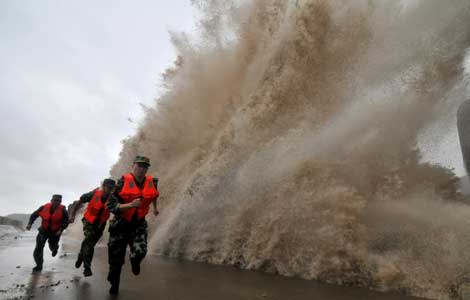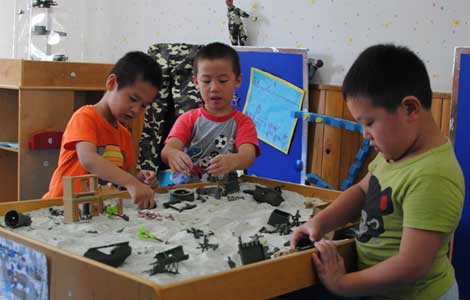China needs to export ‘public goods’: expert
Updated: 2013-10-07 09:34
By KELLY CHUNG DAWSON in New York (China Daily)
|
||||||||
Fundamental conflicts in the way China perceives the function of leadership and its own readiness for the international stage pose potential problems in the country’s “peaceful rise”, experts said at a panel discussion on international relations at Columbia University Sunday.
“While it is very difficult to convince American folks that China is still a developing country when you visit Shanghai and see Chinese people shopping at Burberry, if you consult Chinese students and citizens you’ll get a very different answer,” said Chinese foreign ministry spokesperson Weimin Liu at the 2013 Columbia China Prospects Conference, an annual convening of experts hosted by the university’s Chinese Students and Scholars Association.
“We’re still far from being entirely developed. How is that reflected on the diplomatic front? To be frank, we know we are at the center of the world stage right now but we’re not entirely prepared,” Liu said. “However, we know that we are destined to play an even bigger international role in the coming years, because of our size and our increasing significance.”
Moderated by Sam Suisheng Zhao, a professor of Chinese politics at the University of Denver, the panel featured Liu; Bruce Jenks, assistant secretary general at the United Nations Development Programme; Howard French, a professor at the graduate school of journalism and former New York Times bureau head in Shanghai; and Joseph Fewsmith, a professor of international relations at Boston University.
China is grappling with different conceptions of leadership, Zhao said.
“Others are looking to China to play a leadership role today, but in the Chinese conception of leadership it’s hierarchical,” he said. “It’s ‘I’m the boss and I tell you what to do, and you follow my orders.’ This kind of leadership role does not exist in the context of the United Nations. Global powers are meant to set agendas, identify issues and lead discussions. Will China be able to do that effectively? It’s unclear yet.”
Emerging powers always reach a point at which they must decide whether to conform to existing international standards and power structures, Jenks noted. But rather than think of China as a dynamic force in opposition to static existing powers, it’s more useful to discuss China’s emergence in the context of a world that is also transforming as the result of technology, globalization and other factors, he said.
Internal factors including public pressure are also increasingly important in shaping government policy, Fewsmith said.
“Netizens do not necessarily drive the government, but is more and more difficult for the government to make compromises because any perceived weakness will be magnified by social media,” he said. “It’s difficult to shelve issues without facing a backlash from the public, particularly in an atmosphere in which populist nationalism has grown.”
Fewsmith also questioned Liu’s confirmation that China would not seek external moderators in settling its territorial dispute with Japan, noting that China has moved away from its previously stated goal of multilateralism.
“I think there is a frustration within the foreign ministry,” Liu said. “We are very much arrested by domestic opinion and the outside world. When people in the US are criticizing us for being too assertive, inside our country we are viewed as too soft. Obviously as diplomats we only try to be reasonable, and will continue to work for the best solutions.”
China currently faces an imbalance between the “hard goods” and “public goods” it can offer the world, French said.
“China needs to develop a public goods side of its appeal, and a set of values to propose to the rest of the world commensurate to the dimensions of hard goods it already offers,” he said. “That’s China’s fundamental problem.”
Liu cited China’s leadership role in the Six-Party Talks regarding nuclear energy and North Korea as an example of the country’s efforts to increase contributions of public goods, but acknowledged that China is currently more focused on domestic stability.
He also joked about the extra hours he and his fellow foreign ministry colleagues have put in as a result of the US government shutdown, writing explanatory reports for higher-ups in Beijing.
“We don’t want the US government to weaken, let alone shut down,” he said. “We want to make clear that we do not have the intention or even the capability to challenge the US’ power status.”
kdawson@chinadailyusa.com

 Boehner: US on path to default if Obama won't negotiate
Boehner: US on path to default if Obama won't negotiate
 Williams beats Jankovic to win second China Open title
Williams beats Jankovic to win second China Open title
 Red alerts as Fitow closes in
Red alerts as Fitow closes in
 Disney's new heights
Disney's new heights
 East Asian Games open with subdued fanfare
East Asian Games open with subdued fanfare
 Boys will be boys
Boys will be boys
 Classic clash of the crickets
Classic clash of the crickets
 Albuquerque International Balloon Fiesta kicks off
Albuquerque International Balloon Fiesta kicks off
Most Viewed
Editor's Picks

|

|

|

|

|

|
Today's Top News
Sowing the seeds of new business
Chinese investors visit Silicon Valley
Two Chinese die in plane crash near Saipan
Destroying Syria's gas arms started
Direction charted to resolve disputes
US forces conduct twin raids in Libya, Somalia
No idea when US govt shutdown ends
At least 51 dead in Egypt clashes
US Weekly

|

|






